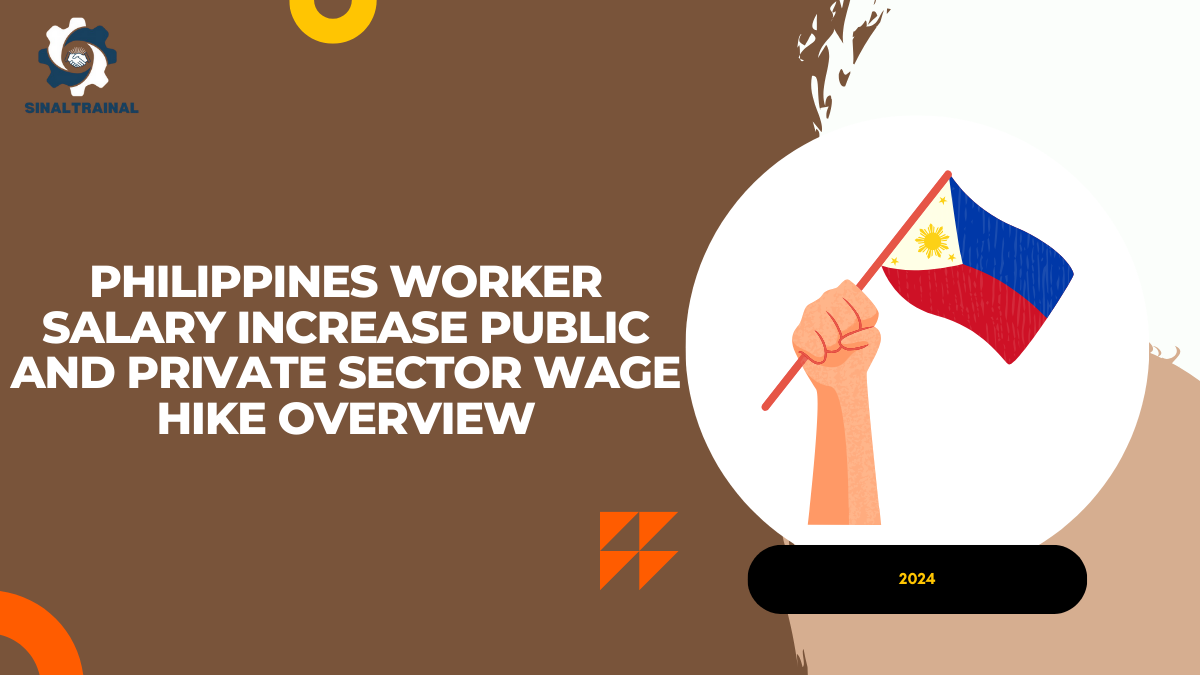As we look toward 2024, Filipino workers—both in public service and the private sector—are set to benefit from significant salary increases. This development signals a transformative moment for the workforce, as the government and businesses alike recognize the need for better compensation to keep pace with the country’s economic changes.
The planned salary hikes for government employees and private sector workers are expected to improve living conditions and increase job satisfaction across the Philippines. In this article, we’ll dive into the specifics of these wage increases, mainly focusing on the four-stage salary hike for public servants and the expected 6.2% median salary increment in the private sector. Additionally, we’ll examine the broader economic implications of these adjustments.

Government Initiative: Four-Tranche Salary Hike for Civilian Employees
One of the most notable actions aimed at addressing the needs of government workers is the Senate’s proposal for a four-tranche salary increase for civilian government employees. This proposal aligns with the ongoing efforts under the Salary Standardization Law of 2019, which seeks to create a fair and competitive wage system within the public sector.
The fourth and final stage of the previous wage hike officially took effect on January 1, 2024. Senator Christopher Lawrence T. Go, who proposed Senate Bill No. 2504, has emphasized the importance of keeping government salaries competitive. He believes that doing so will encourage more Filipinos to consider government service as a viable career option while also helping to reduce the risk of corruption in the sector.
Philippines Public Servant Salary Increase: How It Works
The Department of Budget and Management (DBM) will be responsible for developing the modified four-stage salary increase schedule for public servants. These salary hikes are set to start on January 1, 2024, and will continue yearly until 2027. The goal is to ensure that government salaries remain equitable and reflect the value of civil service employees’ contributions.
One key aspect of the proposal is that not all government workers are included. The salary adjustments will apply primarily to civilian employees, excluding military personnel, uniformed officers, and employees of government-owned or -controlled corporations. The government is aiming to create a compensation structure that promotes values such as integrity, accountability, productivity, and excellence in public service.
Economic Implications and Budget Allocation
The planned salary increases come at a cost, but the government has already earmarked a considerable budget for these adjustments. According to Budget Secretary Amenah F. Pangandaman, approximately P17 billion has been allocated to cover public servant salary hikes in the upcoming year. This substantial allocation demonstrates the government’s dedication to offering competitive pay for its workers, ensuring the public sector attracts and retains skilled employees.
By investing in competitive wages, the government aims to elevate the quality of work performed by its employees, ultimately benefiting the nation as a whole. This move is also seen as essential for fostering social justice and fairness in the public sector.
Private Sector Response: Median Salary Increase of 6.2%
The private sector is also preparing for notable salary adjustments in 2024. According to a survey by global professional services firm Mercer, the median salary increase in the private sector is projected to be 6.2%. This increase represents a slight rise from the 6% increase seen in the previous year.
Several factors are driving this growth, including the rising demand for skilled professionals, fierce competition for top talent, and ongoing inflationary pressures. The 6.2% salary increase reflects the country’s efforts to keep up with global challenges while ensuring economic progress.
Key Sectors Expected to See Salary Growth
Mercer’s survey reveals that the Philippine economy is well-positioned for growth, with specific sectors expected to experience significant wage increases. Some of the industries projected to see the most significant salary growth include:
- Energy Sector: Leading the way with an expected 7% salary increase
- High-Tech Industry: Anticipated to grow by 6.8%
- Retail & Wholesale: Estimated wage increase of 6.7%
- Consumer Goods: Projected to rise by 6.5%
These industries are seen as key drivers of economic expansion in the Philippines, contributing to the overall demand for skilled labour.
Regional Comparison: Philippines vs. Asia
The median salary increase in the Philippines stands out when compared to other countries in the region. The projected 6.2% wage hike surpasses the Asia-wide average of 5.2%, showcasing the Philippines’ dedication to rewarding its workforce. In emerging economies such as India, Vietnam, and Indonesia, median salary increases are generally higher than those in more developed economies like Japan, Taiwan, and Hong Kong.
This disparity highlights the difference in economic progression across the region, with developing countries striving to boost wages more rapidly to match rising living costs and inflation.
Broader Economic Impact and Challenges
While the salary increases are a welcome development, they also come with specific challenges. The government will need to strike a balance between offering competitive wages and ensuring economic sustainability. If salary hikes outpace economic growth, it could lead to inflation or other financial strains.
The private sector, too, will need to manage the effects of wage increases on profitability. Companies may have to adjust their business models to accommodate higher labour costs, potentially leading to price increases for consumers.
Conclusion: Positive Outlook for Filipino Workers
The planned salary increases for both public servants and private-sector employees in 2024 represent a step toward improving working conditions and overall job satisfaction in the Philippines. These wage hikes reflect the government’s commitment to creating a more equitable, fair, and competitive labour market.
By addressing the compensation needs of its workforce, the Philippines is on a path to sustained economic growth and improved living standards for its citizens. However, it will be crucial to monitor the impact of these salary adjustments closely to ensure that they result in long-term benefits for both workers and the nation as a whole.
The coming years hold promise for Filipino workers, as higher salaries are expected to lead to greater job satisfaction, increased spending power, and improved quality of life.
Click here to know more.